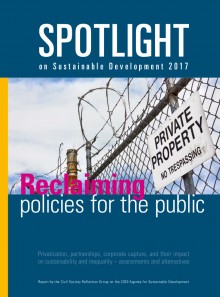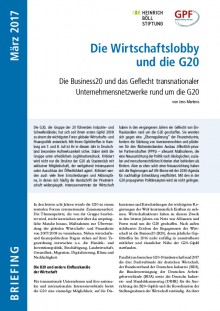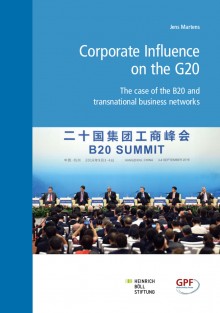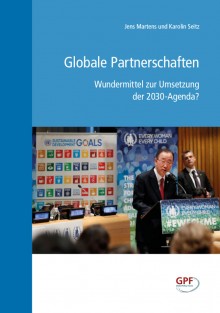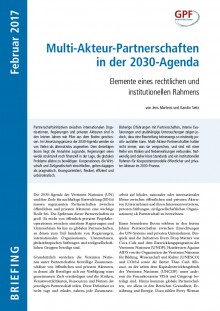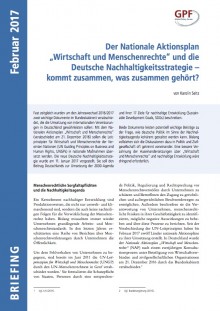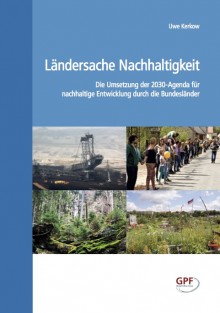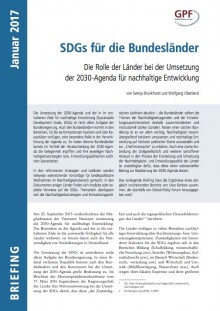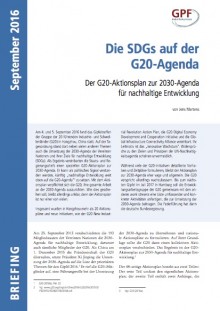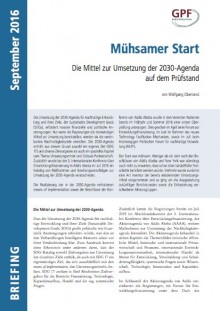Publikationen
Spotlight on Sustainable Development 2017
Die Business20 und das Geflecht transnationaler Unternehmensnetzwerke rund um die G20
The case of the B20 and transnational business networks
Wundermittel zur Umsetzung der 2030-Agenda?
Die 2030-Agenda der Vereinten Nationen und ihre Ziele für nachhaltige Entwicklung (SDGs) messen Partnerschaften zwischen öffentlichen und privaten Akteuren eine wichtige Rolle bei. Das Spektrum dieser Partnerschaften ist groß. Es reicht von öffentlich-privaten Projektkooperationen zwischen einzelnen Regierungen und Unternehmen bis hin zu globalen Partnerschaften, an denen zum Teil hunderte von Regierungen, internationalen Organisationen, Unternehmen, philanthropischen Stiftungen und zivilgesellschaftlichen Gruppen beteiligt sind.
Einen besonderen Boom erlebten in den letzten Jahren Partnerschaften zwischen Einrichtungen des UN-Systems und privaten Unternehmen sowie globale Partnerschaften [...]
Elemente eines rechtlichen und institutionellen Rahmens
Partnerschaftsinitiativen zwischen internationalen Organisationen, Regierungen und privaten Akteuren sind in den letzten Jahren wie Pilze aus dem Boden geschossen. Im Umsetzungsprozess der 2030-Agenda werden sie von Vielen als alternativlos angesehen. Dem derzeitigen Boom liegt die Annahme zugrunde, Regierungen seien weder strukturell noch finanziell in der Lage, die globalen Probleme alleine zu bewältigen. Kooperationen, die Wirtschaft und Zivilgesellschaft einschließen, gelten dagegen als pragmatisch, lösungsorientiert, flexibel, effizient und unbürokratisch.
Bisherige Erfahrungen mit Partnerschaften, interne Evaluierungen und unabhängige Untersuchungen zeigen jedoch, dass eine [...]
Kommt zusammen, was zusammen gehört?
Fast zeitgleich wurden um den Jahreswechsel 2016/2017 zwei wichtige Dokumente im Bundeskabinett verabschiedet, die die Umsetzung von internationalen Vereinbarungen in Deutschland gewährleisten sollen: Mit dem Nationalen Aktionsplan „Wirtschaft und Menschenrechte“ (verabschiedet am 21. Dezember 2016) sollen die Leitprinzipien für Wirtschaft und Menschenrechte der Vereinten Nationen (UN Guiding Principles on Business and Human Rights, UNGPs) in nationale Maßnahmen übersetzt werden. Die neue Deutsche Nachhaltigkeitsstrategie wurde am 11. Januar 2017 vorgestellt. Sie soll den Beitrag Deutschlands zur Umsetzung der 2030-Agenda und ihrer [...]
Die Umsetzung der 2030-Agenda für nachhaltige Entwicklung durch die Bundesländer
Wegen ihrer Zuständigkeit für wichtige Politikfelder spielen die Bundesländer bei der Umsetzung der 2030-Agenda in und durch Deutschland eine zentrale Rolle. Ganz im Sinne der im September 2015 in New York verabschiedeten Nachhaltigkeitsagenda sind davon prinzipiell alle Sektoren betroffen, von der Sozial- über die Landwirtschafts-, Bildungs- und Umweltpolitik bis hin zur Wirtschafts- und Industriepolitik.
Dabei gilt, dass es weniger ein Problem sein dürfte, innerhalb der Nachhaltigkeitsstrategien der Länder auf Diskurse aus dem wirtschafts-, sozial- oder umweltpolitischen Bereich zu rekurrieren. Vielmehr [...]
Die Rolle der Länder bei der Umsetzung der 2030-Agenda für nachhaltige Entwicklung
Die Umsetzung der 2030-Agenda und der in ihr enthaltenen Ziele für nachhaltige Entwicklung (Sustainable Development Goals, SDGs) ist nicht allein Aufgabe der Bundesregierung. Auch den Bundesländern kommt in den Bereichen, für die sie Kompetenzen besitzen und über Kapazitäten verfügen, eine besondere Rolle in der Verwirklichung der Agenda zu. So haben diverse Bundesländer bereits im Vorfeld der Verabschiedung der 2030-Agenda die Gelegenheit ergriffen und ihre jeweiligen Nachhaltigkeitsstrategien bzw. Entwicklungspolitischen Leitlinien überarbeitet.
In den reformierten Strategien und Leitlinien werden teilweise weitreichende Vorschläge [...]
Der G20-Aktionsplan zur 2030-Agenda für nachhaltige Entwicklung
Am 4. und 5. September 2016 fand das Gipfeltreffen der Gruppe der 20 führenden Industrie- und Schwellenländer (G20) in Hangzhou, China statt. Auf der Tagesordnung stand dort neben vielen anderen Themen auch die Umsetzung der 2030-Agenda der Vereinten Nationen und ihrer Ziele für nachhaltige Entwicklung (SDGs). Als Ergebnis vereinbarten die Staats- und Regierungschefs einen speziellen G20-Aktionsplan zur 2030-Agenda. Er kann als politisches Signal verstanden werden, künftig „nachhaltige Entwicklung weit oben auf die G20-Agenda“ zu setzen. Mit dem Aktionsplan verpflichtet sich [...]
Die Mittel zur Umsetzung der 2030-Agenda auf dem Prüfstand
Die Umsetzung der 2030-Agenda für nachhaltige Entwicklung und ihrer Ziele, der Sustainable Development Goals (SDGs), erfordert massive finanzielle und politische Anstrengungen. Nur wenn die Regierungen die notwendigen Mittel zur Umsetzung bereitstellen, werden sie die vereinbarten Nachhaltigkeitsziele erreichen. Die 2030-Agenda enthält aus diesem Grund sowohl ein eigenes Ziel (SDG 17) und diverse Zielvorgaben als auch ein spezielles Kapitel zum Thema Umsetzungsmittel und Globale Partnerschaft. Zusätzlich wurde bei der 3. Internationalen Konferenz über Entwicklungsfinanzierung in Addis Abeba im Juli 2015 ein Katalog [...]

